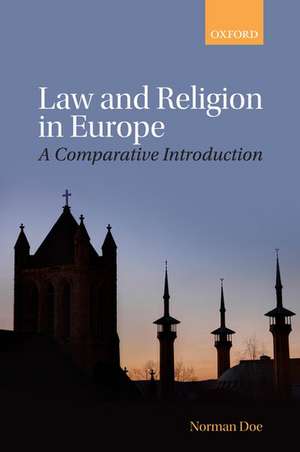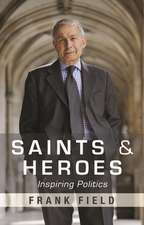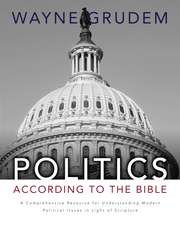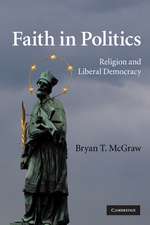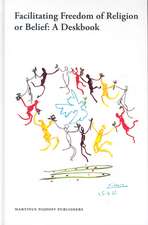Law and Religion in Europe: A Comparative Introduction
Autor Norman Doeen Limba Engleză Hardback – 3 aug 2011
| Toate formatele și edițiile | Preț | Express |
|---|---|---|
| Paperback (1) | 425.64 lei 6-8 săpt. | |
| Oxford University Press – 3 aug 2011 | 425.64 lei 6-8 săpt. | |
| Hardback (1) | 843.66 lei 6-8 săpt. | |
| OUP OXFORD – 3 aug 2011 | 843.66 lei 6-8 săpt. |
Preț: 843.66 lei
Preț vechi: 1028.86 lei
-18% Nou
Puncte Express: 1265
Preț estimativ în valută:
161.49€ • 175.47$ • 135.74£
161.49€ • 175.47$ • 135.74£
Carte tipărită la comandă
Livrare economică 21 aprilie-05 mai
Preluare comenzi: 021 569.72.76
Specificații
ISBN-13: 9780199604012
ISBN-10: 0199604010
Pagini: 334
Dimensiuni: 171 x 243 x 26 mm
Greutate: 0.59 kg
Editura: OUP OXFORD
Colecția OUP Oxford
Locul publicării:Oxford, United Kingdom
ISBN-10: 0199604010
Pagini: 334
Dimensiuni: 171 x 243 x 26 mm
Greutate: 0.59 kg
Editura: OUP OXFORD
Colecția OUP Oxford
Locul publicării:Oxford, United Kingdom
Recenzii
a valuable conspectus of the whole field of the legal territory where religion and politics abut on one another.
The author presents a very detailed investigation into different areas of state-religion relations: The Scope, Sources, and Systems of Religion Law; Religious Freedom and the Individual; Religious Discrimination and Hatred; The Legal Position of Religious Organizations; The Autonomy and Ministers of Religious Organizations; The Protection of Doctrine and Worship; The Property and Finances of Religion; Religion, Education and Public Institutions; and Religion and the Family: Marriage and Children.
The chapters Doe provides are wide-ranging, examining religious discrimination and hatred; the legal personality of religious organizations; the position of ministers of religion (and institutional autonomy); the protection of doctrine and worship; financial support for religion; religion in education and other public institutions; religion and the family; and the religion law of the European Union.
Professor Doe's innovative new book is one of those rare texts which changes the way in which a field of study is understood. It has long been thought that European legal systems differ substantially in how they deal with religion, with the French separation of Church and State contrasted, for instance, with the presence of the established Church in England. However, Law and Religion in Europe demonstrates how the laws affecting religion in European States are actually underpinned by common principles. Doe's book delights in questioning long-held assumptions, debunking conventional understandings and proposing bold new research questions. It is destined to become a classic in the field.
This seminal book represents an invaluable resource for anyone seeking an understanding not only of what religion has to say about the world in which we live, but also, and more importantly, about what law says, and how it treats, those disparate religious voices.This seminal book represents an invaluable resource for anyone seeking an understanding not only of what religion has to say about the world in which we live, but also, and more importantly, about what law says, and how it treats, those disparate religious voices.
an invaluable contribution ... and it will be an illuminating tool to commentators with an interest in Public, Property, Family and Comparative Law ... Furthermore, its interdisciplinary and comparative nature also makes it relevant to those with an interest in Sociology, Political Science and History, not only in the United Kingdom, but also across the European continent and elsewhere.
The author presents a very detailed investigation into different areas of state-religion relations: The Scope, Sources, and Systems of Religion Law; Religious Freedom and the Individual; Religious Discrimination and Hatred; The Legal Position of Religious Organizations; The Autonomy and Ministers of Religious Organizations; The Protection of Doctrine and Worship; The Property and Finances of Religion; Religion, Education and Public Institutions; and Religion and the Family: Marriage and Children.
The chapters Doe provides are wide-ranging, examining religious discrimination and hatred; the legal personality of religious organizations; the position of ministers of religion (and institutional autonomy); the protection of doctrine and worship; financial support for religion; religion in education and other public institutions; religion and the family; and the religion law of the European Union.
Professor Doe's innovative new book is one of those rare texts which changes the way in which a field of study is understood. It has long been thought that European legal systems differ substantially in how they deal with religion, with the French separation of Church and State contrasted, for instance, with the presence of the established Church in England. However, Law and Religion in Europe demonstrates how the laws affecting religion in European States are actually underpinned by common principles. Doe's book delights in questioning long-held assumptions, debunking conventional understandings and proposing bold new research questions. It is destined to become a classic in the field.
This seminal book represents an invaluable resource for anyone seeking an understanding not only of what religion has to say about the world in which we live, but also, and more importantly, about what law says, and how it treats, those disparate religious voices.This seminal book represents an invaluable resource for anyone seeking an understanding not only of what religion has to say about the world in which we live, but also, and more importantly, about what law says, and how it treats, those disparate religious voices.
an invaluable contribution ... and it will be an illuminating tool to commentators with an interest in Public, Property, Family and Comparative Law ... Furthermore, its interdisciplinary and comparative nature also makes it relevant to those with an interest in Sociology, Political Science and History, not only in the United Kingdom, but also across the European continent and elsewhere.
Notă biografică
Norman Doe is a Professor of Law and Director of the Centre for Law and Religion at the Law School, Cardiff University, and course director of the LLM in Canon Law there. He studied law at Cardiff, for his doctorate at Cambridge, and theology at Oxford, and is a barrister. His publications include Fundamental Authority in Late Medieval English Law (CUP, 1990), The Legal Framework of the Church of England (OUP, 1996) and Canon Law in the Anglican Communion (OUP, 1998). He has acted as a consultant in canon law to the Anglican Communion, is a founding member of the Colloquium of Anglican and Roman Catholic Canon Lawyers, and served as President of the European Consortium for Church and State Research (2010). He was a visiting fellow at Trinity College Oxford for a term in 2011 and teaches each year as an associate professor at the University of Paris.
